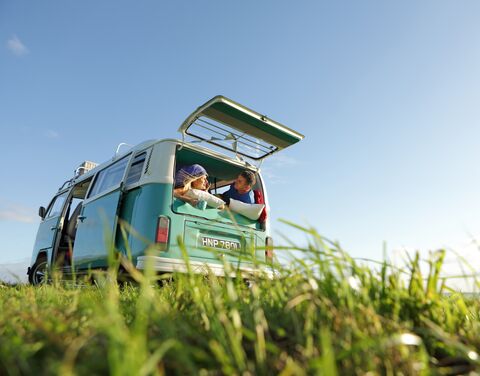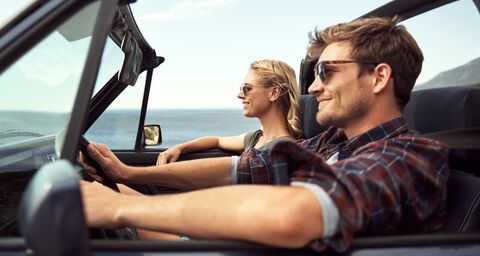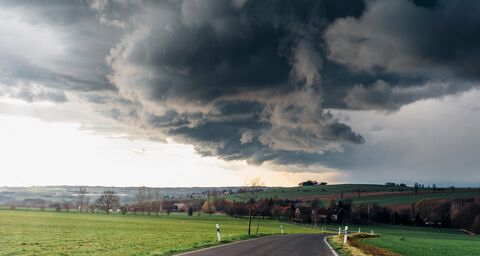
Five key rules for your RV vacation
Finally, the time has come to set off on an RV adventure! Are you living the dream of owning your own RV or perhaps intending to rent one? If so, you probably can't wait to get out on the road – the Swiss Alps, Bella Italia, France, and Austria are out there waiting to be discovered.
Before you do, just take note of our five simple rules to make sure that you reach your destination safely and nothing spoils your RV vacation.
Safety first
Exploring the countryside in Switzerland and across the border in a mobile home promises to be an unforgettable experience, whether you're looking to discover lots of new places or simply spend a few days enjoying your favorite campsite. If you're planning your first RV trip, there are some regulations and laws you need to know. We've come up with five key rules to keep you and other road users safe.
1. Don't overload your RV.
About to head off on vacation? The adventure starts with loading up the RV. If you're carrying bikes, a kayak, and four people, it's not hard to get up to 3.5 tons. That's the maximum vehicle weight, including trailer, permitted for a category B driver's license. The maximum permitted weight of an RV or trailer is shown under point 33 of the vehicle registration document. Subtracting the curb weight, which includes the weight of the driver and fuel (shown under point 32 of the registration document), gives you the maximum permitted load. You risk a fine of up to CHF 250 if you exceed this limit, so it's advisable to weigh the items you load and work out the total weight. Most waste disposal and recycling centers have truck scales that let you check the overall weight of the loaded vehicle.
Special rules for trailers
The overall weight of the towing vehicle plus the trailer is somewhat less problematic as you also have the permitted load of the towing vehicle, but it's all the more important to distribute the load correctly so that the trailer remains stable and doesn't start fishtailing as you drive. With any type of trailer, you also have to observe the maximum nose weight. That's the weight acting on the towing vehicle's towbar, and it's usually 50-70 kg (check the information supplied by the manufacturer).
2. Rear-view mirrors: essential to safety
Rear-view mirrors are mandatory for safety reasons. An RV or the vehicle towing a trailer must have them on the left and right sides. Visibility to the side and at least 100 m behind must be ensured. Special add-on mirrors that can be either securely mounted or simply stuck in place are ideal. For especially wide RVs and trailers, convex mirrors with extended brackets are available that offer an enlarged field of vision.
3. How to reverse safely
Did you know that driving in reverse for anything other than a short distance (e.g. for parking) has been banned in Switzerland since January 1, 2016, unless it's impossible to continue or turn around? The ban also applies to cars, and for good reason: between 2011 and 2014, more than 3,000 accidents a year were caused by careless reversing. When reversing a vehicle with restricted rearward vision such as an RV or a vehicle towing a trailer, you should get someone to help.
4. Wild camping: caution is advised
A small campfire flickers in a secluded meadow high above the forest. You and your loved ones sit around it, perhaps reminiscing about days gone by, telling stories of your RV journey or just quietly gazing at the stars. Wild camping, in other words just pitching up wherever you want, isn't generally prohibited in Switzerland, but the rules differ from canton to canton. Before you travel, check what's allowed in the canton where you want to stay. In the canton of Zurich, for instance, wild camping is only allowed if you have the landowner's permission. Wild camping is prohibited all over Switzerland in the following:
- Nature reserves
- The Swiss National Park
- Hunting areas
- Quiet zones for game
- Restricted areas
If you want to spend your nights out in the wild without getting into trouble, you should check in advance with the relevant canton or commune. If you'd rather play it safe, restrict yourself to authorized campsites.
5. Things to remember if you're traveling outside Switzerland
- You must attach a CH sticker to your vehicle before entering another country.
- As of January 1, 2021, RVs weighing more than 3.5 tons need to be fitted with blind spot stickers for driving in France. You can be fined EUR 140 if you don't have them.
- In Germany, RVs are allowed to drive at 100 km/h on highways, subject to certain conditions. Only vehicles that have been inspected by an expert in accordance with German law can receive a "100" sticker.
Get the information and coverage you need for a relaxing vacation with your RV
Camping is a unique opportunity to get close to nature and take time out from the pressures of everyday life. However, as much as you want to enjoy beautiful landscapes and the freedom of the open road, you shouldn't forget about the unforeseen incidents and risks that go with any journey. From a sudden change in the weather to medical emergencies and even having to cut your trip short, all sorts of situations can arise that might cause stress and cost a lot of money if you aren't prepared for them.
Taking out travel insurance is thus an important step to safeguard against such eventualities. A good policy will cover a whole host of risks, in particular the cost of having to cancel your trip or end it early, medical expenses abroad, and lost or damaged luggage and personal items. It can also provide valuable support and advice in an emergency, for example if your car or RV breaks down. This is all the more important when you’re traveling in a foreign country.
Tip: driving safely with a trailer
If you're towing a trailer behind your RV, you'll need a breakaway cable. It has to be attached correctly to a ring or tab, usually on the towing vehicle or its towbar. If the towing vehicle doesn't have one, you'll have to get one fitted. Each canton has its own rules and checks. You could be fined if you don't have a breakaway cable or if your cable isn't attached properly.






